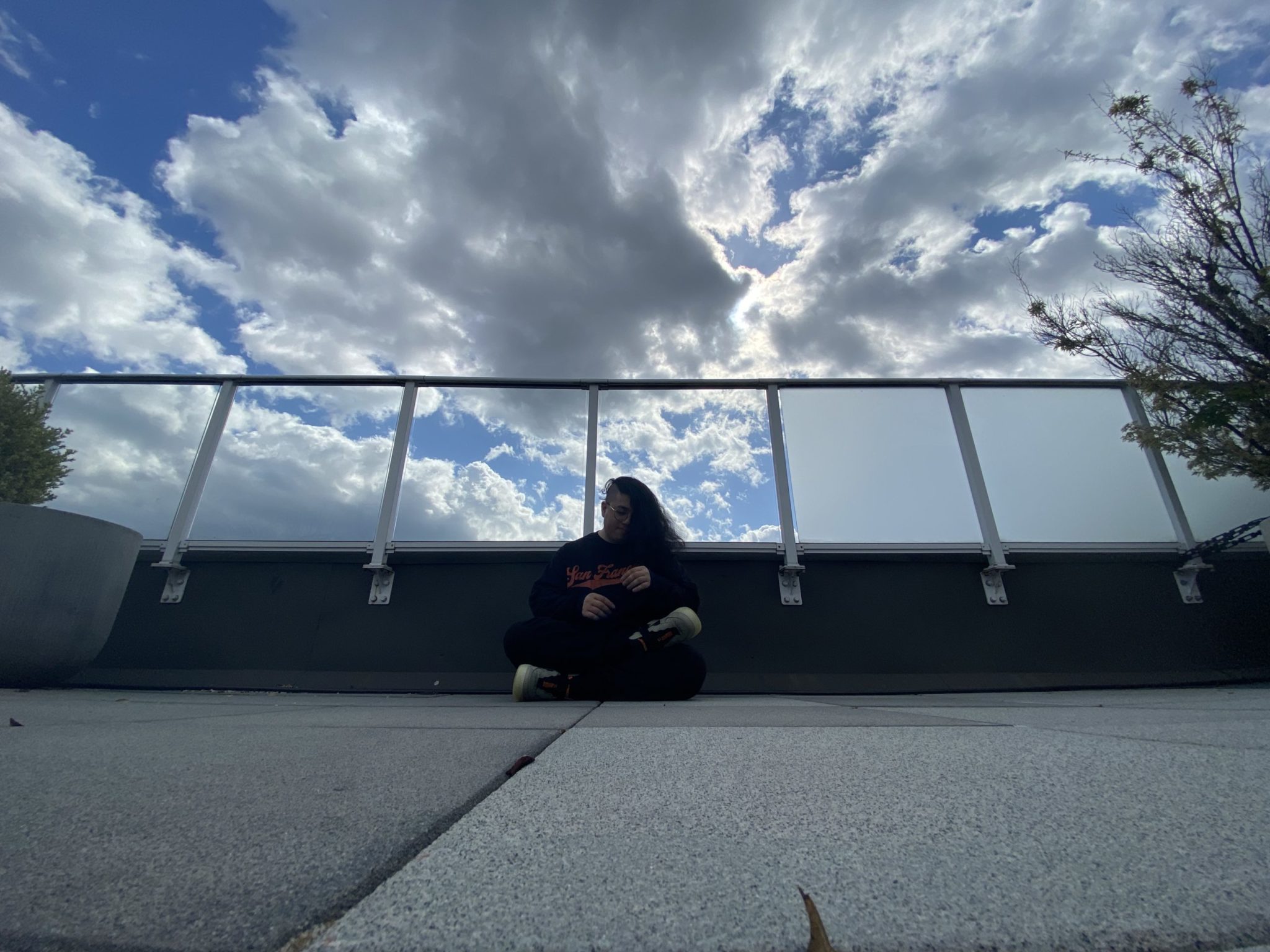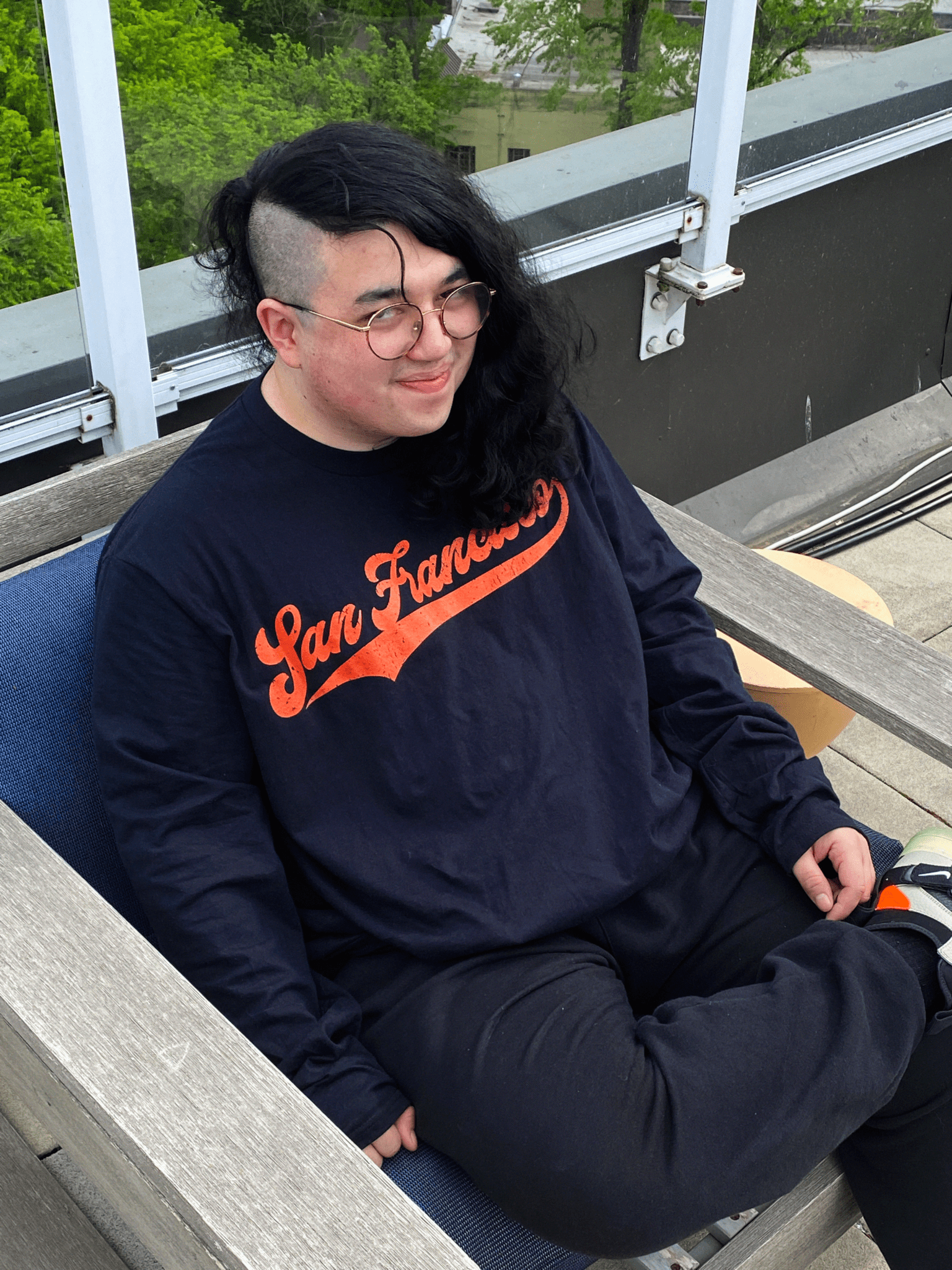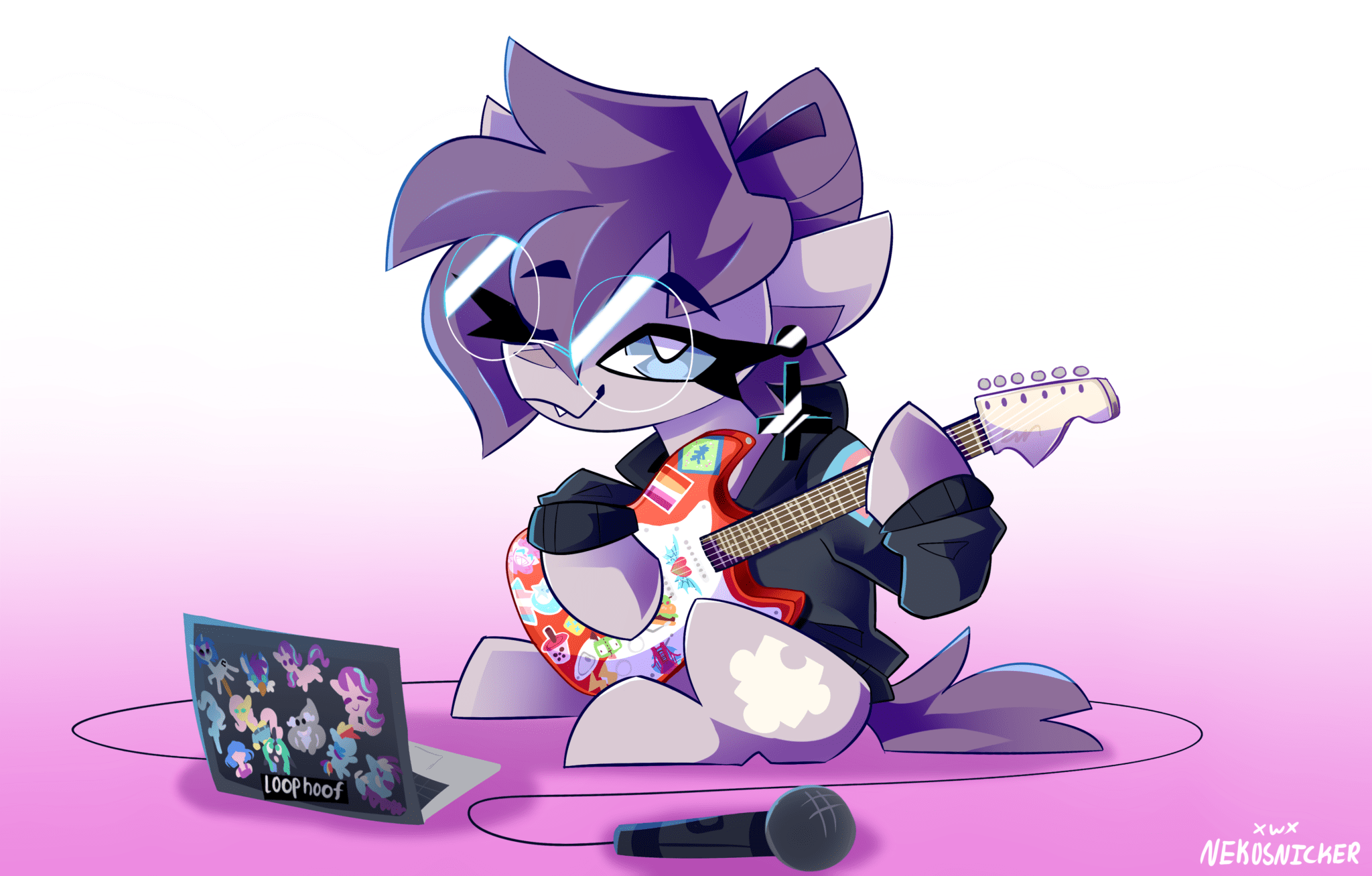Discovering Vylet Pony took me right back to the moment I stumbled across Sufjan Stevens’ “Illinois” over a decade ago. I couldn’t define ‘indie’ or what I loved about it at the time, but now I think I know: an ‘indie’ record like Illinois revels in the combined talent and freedom of a creator working completely on their own terms. “Illinois” still sounds like nothing else today, and I have a feeling that many of Vylet’s records will follow the same path. She leaps effortlessly between branches of EDM with various forays into synthpop, alternative metal, R&B, and a laundry list of other genres. All the while, her songs are packed with personal, transportive lyrics Vylet performs with stunning range and conviction. Her albums tend to be beautifully constructed, guided by emotional narratives, and couched in musical worlds that take skill and conviction to inhabit.
While Vylet’s music is guided by the My Little Pony: Friendship is Magic television series and the community built around it, her albums are undoubtedly all her own. It doesn’t take grounding in show lore to feel the cathartic, fear-conquering rush of “I Was Afraid” or the heart-wrenching loss behind “Diaries I Kept.” Nowhere is Vylet’s music more narratively impactful than on her magnificent new record “CUTIEMARKS,” a triumphant affirmation of queer survival in the face of threats both internal and external. In this interview, Vylet and I talk creation, inspiration, and what marks the difference between her newest album and her vast back catalog.

FM: When and how did you start making music?
Vylet Pony: Around 2006, we had a laptop set up with a KORG M1 keyboard & Garageband in the living room and that’s where I started creating. It was primarily just an experimental hobby until middle school. There was a teacher named Harper and he introduced me to electronic music in 2012. Before then, I felt very limited in the music I could experience and desire, so he opened up a whole world to me and I started making electronic music. He encouraged this, and I showed him stuff; not long after I came into the MLP fandom — after I had written a few MLP songs like “No Matter What” — I worked on a project for his history class and it required us to present through music. The enthusiasm it received from my peers and Harper himself made me realize what my passion in life was. I wrote a song about him for this album, CUTIEMARKS, and it’s one of my favourite moments on the project.
You’re very prolific, but you also tend to create records with arcs that feel precisely constructed. What’s your process for crafting a record, or on a smaller scale, an individual song?
It’s always so different. I think trying to establish golden rules and mantras for every single thing in a creative space can end up being overbearing. Like if you do that, the moment you feel fluid in your creativity, the more anxious you’ll be about breaking your alleged “one size fits all” perspectives of music. Sometimes I start a song by day dreaming and hearing it in my head. Sometimes I’ll hear something in a video game or movie and it’ll spark something in me. Sometimes I’ll be experimenting with sound design and playfully exploring different ideas and melodies without even worrying about writing a song yet. Rarely do I ever start with lyrics, but often times when I start a song with lyrics, it ends up being the most thoughtful stuff I think. ISOMETRICA was written that way. The concepts and stories intertwine with those processes and often come about the same way.
As someone pulling from the MLP canon, but also crafting their own version of it, how do you balance your own creativity and respect for the source material?
I suppose I don’t worry about balancing it at all. There are times where I love embracing what MLP has to say and how it interprets its characters. But then sometimes, it’s powerful to me to be able to challenge those things and juxtapose these magical horses against a very real and sometimes grim personal reality. To quote from the CUTIEMARKS booklet: “Many of my songs and stories are articulated through and about the characters of My Little Pony. I do this because it establishes a creative palette through something I love and adore, using the expectations and conventions of these characters as a starting point for either affirming or contrasting concepts.”
It’s not uncommon for you to splash across dozens of genres during an album. What guides your decision-making process re: which song or story goes with which style?
Honestly, I dunno. I haven’t thought very actively about decisions like that. It feels very obvious to me a lot of the time like ‘oh of course this angry song idea will fit with a punk sound’ or ‘this is a really cinematic moment in the story, it should sound like Hanz Zimmer meets Nero’. If there’s something I don’t know how to do and I want to do it then I’ll learn how to do it.
The credits and features on your records make it apparent that you have a community of artists that you collaborate with. Can you tell me about how you find and build relationships with other musicians?
For the most part, I tend to work with people I’m friends with or know. I honestly really love working with friends who haven’t had much or any experience writing or participating in music because they have ideas that will differ so much from what an informed musician will. CUTIEMARKS has a lot of things like that especially. I hate this idea that people get like “oh well you’re not a musician, you don’t know what you’re talking about,” but I think it’s the dreamers and listeners who have the most valuable opinions when it comes to music.
But a lot of the time when I’m working with people like Sylver or Chi Chi or Namii, it’s because friendship and deeper connections end up translating to a more fun experience for me. I can’t help myself sometimes though, occasionally I’ll work with someone purely because I hear their work and felt like “I HAVE to do something with them,” but that’s rare.

Which collaborations have shaped you most as a musician?
Sylver Stripe, my friend Izzy, is [hooves]-down the most important person in my entire collaborative music experience. We’ve been writing music and stories (such as Starship Ponyville) together since 2012 and our relationship has been so important to me that I wrote “37.6486° N, 122.4296° W” with and about him. We essentially grew up learning how to make music in different ways and then coming together to share what we learned. I was more on the electronic side while he was more on the acoustic. Over the years we merged with each other and now we’ve filled in those parts creatively and can do both. (P.S. I’m helping him distribute his solo debut EP project soon. Really excited about that.)
Quite recently, you featured on Maple’s debut LP, which is not the first time you’ve featured outside of directly MLP-related music. However, it is the first time I’ve seen you featured alongside a bunch of up-and-coming ‘hyperpop’ artists – which isn’t a super surprising turn after the release of “LESBIAN PONIES WITH WEAPONS,” but it’s still something a lot of Vylet fans probably find exciting. Is this a one-off or are there plans to work more in that realm, or with those artists, in the future?
One of my biggest goals ever since joining the fandom and making music was to try and bridge the gap between fandom and non-fandom music. It’s still very much an aspiration of mine and I will continue to do this in ways that feel meaningful. I’ve been talking with a few artists outside the fandom and have plans to have them hop on for a few pony tunes, they’re down with it. I’ve already done this with huge inspirations of mine like KLRX and Slyleaf. I wanna go crazier.

You’ve said a few times that CUTIEMARKS is a very personal project. What kind of experiences are informing the narratives on these tracks?
It’s so many things. But I think the songs themselves will establish enough specificity about the things that I’ve been dealing with in the present and the things I’ve been examining from the past.
Is there anything that makes this project markedly different from previous projects?
Complete and utter honesty. I’ve been hesitant to open too much about my life and feelings in a lot of my music. I often project onto things and analyze feelings and memories in vague ways through different characters. But this time, everything is very very visceral and real. Like, I feel like the sad songs I’ve written in the past are more just melancholic and contemplative. CUTIEMARKS really expresses deeper feelings than that.
Do you see this fitting in an arc within your discography? And/or, how has your experience crafting previous records prepared you for your work on this one?
CUTIEMARKS references different material and stories that I’ve written over the years. I wanna leave it up to interpretation as to how that fits into everything else, if even.
But in terms of my personal growth as a musician, there’s so much on here that I think I needed to be ready for in order to take on. The biggest progress I think this album has been an outlet for is for lyrics. I don’t know if I’ve ever been all that good of a lyricist, but I’ve tried hard on this album to put more love into it. Having worked on projects like Mystic Acoustics and Homeward, I’m confident in my compositional and instrumental prowess enough so that it can become automatic in my head and let me focus on lyrics.
What is it about MLP that makes it such a rich foundation for both your music and your personal expression?
Fiction. Wildly expressive and magical fantasy. It fills my brain with so many colours and feelings and I think my experience of life is complete with that kind of thing. I don’t think reality and imagination can realistically exist independently of each other. We experience the world exclusively through our brains, and being able to articulate our feelings and experiences through things as wildly expressive as something like MLP is very important to me.
How has art and community, MLP or otherwise, helped you find your own identity?
Awareness is the biggest thing. It can seem like an obvious idea at first, but just making personal concepts — such as identity — known through art opens up worlds for other people. I didn’t know anything about queerness until I was online; it was something I had experienced all my waking life, but I more or less thought I was being an idiot until I discovered gay people and trans people existed.
What resources, experiences or exercises would you recommend to fans who are also trying to find the best versions of themselves?
Don’t feel like you have to immediately figure everything out. Explore what’s comfortable for you and don’t be afraid of shifting things as you learn more about yourself. Humans are rather fluid in nature, we grow so much over time and personal identity is so intrinsically tied to that. It’s also so important to admit when you’re wrong or perhaps ill-informed about something. One of my biggest weaknesses in my own past was being comfortable with staying in one place intellectually. Always seek truth and be open to molding your worldviews as you both succeed in your goals and make mistakes.

On top of music, you’re also a writer and a virtual artist (among other pursuits) – how do those mediums serve you in ways that music doesn’t?
That’s something else I haven’t thought too actively about before until now. Music, art, stories, films, all of that is just a part of this big, creative melting pot. They’re clearly distinct from each other, but I think they’re all very inherent to what we are as humans. Everyone has a deep desire to create and tinker and these are just aspects of that part of ourselves. It just feels natural that if you delve into one, you feel like trying others. They serve the same purposes, I think, but with varying degrees of interpretation and expression. Like sometimes it just feels right to draw or design something instead of write a song.
Are there any non-musical projects that you’re particularly proud of or excited about?
I was just talking with my partner about creating some zines together. I’ve been developing this Can Opener character and I really wanna get these things out of my head and into other peoples’ minds. It’s exciting.
We’re excited to share a handful of playlists of your music and influences, and I wanted to close out this interview with a chance to go a little deeper – is there a specific track, album, or even a moment in a specific track that, for you, encapsulates the sheer power of what music can do, or makes your heart jump up in that cathartic way? What is it about that musical object that makes it so powerful, and how do you try to reach for that level of impact in your own music?
This year, Underscores released their debut LP “Fishmonger”. In just a few months, it’s become one of my all-time favourite musical projects ever. It’s perfect to me in every way. Visceral storytelling, otherwise subdued feelings and concepts, explosive and equally contemplative instrumentals and vocal performances, and an immensely compelling wholeness to it. To me, it encapsulates this beautiful relationship between positive and negative spaces, giving purpose to both aspects of music and making that an entire narrative device.
One of the most powerful things I’ve ever experienced in music was listening through “Fishmonger” from start to finish. It remains abrasive and intense for most of its tracklist, but then indicates a very crucial shift in tone & story when the 2nd half of “Dry Land 2001” comes on. Suddenly, the abrasive perspective that the listener develops through the album becomes swept from right beneath them as everything cascades into this symphony of soft contemplation. It follows up with “The Fish Song” which, in tandem with the backstory (that you can read on Genius.com), is a number that I’m proud to award ‘song I’ve cried most to in my whole life’. It’s so stripped down and lyrically heart-wrenching, which is only ever more powerful given its place against the rigid and almost violent, sonic qualities of the first half of “Fishmonger”. Listening to the album, reading the lyrics, and any available backstories, makes for an experience that I feel represents all my favorite things in music.
Thank you so much for the interview, Vylet! Is there anything else you’d like to share with readers? (Upcoming projects, exciting events, etc.)
CUTIEMARKS came out on July 30th. It’s on Bandcamp and Spotify and stuff! The Bandcamp version comes with a digital booklet that I designed. And also, as I said earlier, I’m planning to help Sylver release his debut EP project, so if you like acoustic guitar and ambient atmospheres, you’re gonna wanna keep an eye out for that. I’ll announce it on Twitter and YouTube and stuff. <3
Images courtesy of Vylet Pony
Have strong thoughts about this piece you need to share? Or maybe there’s something else on your mind you’re wanting to talk about with fellow Fandomentals? Head on over to our Community server to join in the conversation!

